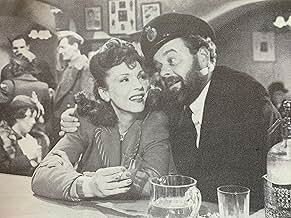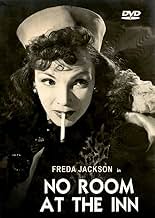Zwei Kinder werden während des Zweiten Weltkriegs evakuiert und in die "Obhut" einer alkoholkranken Frau gegeben.Zwei Kinder werden während des Zweiten Weltkriegs evakuiert und in die "Obhut" einer alkoholkranken Frau gegeben.Zwei Kinder werden während des Zweiten Weltkriegs evakuiert und in die "Obhut" einer alkoholkranken Frau gegeben.
Fotos
Marie Ault
- Vicar's Maid
- (Nicht genannt)
Vera Bogetti
- Barmaid
- (Nicht genannt)
Handlung
Ausgewählte Rezension
I saw this film for the first time very recently at the Mediatheque at the BFI in London and was stunned by the film itself, and the excellent performances of Freda Jackson and Joan Dowling in particular.
"No Room At The Inn" was originally a stage play by Joan Temple in which Freda Jackson scored an immense success as the despicable Mrs Voray. The play opened at the Embassy Theatre in London in 1945, and Miss Jackson repeated her triumph the following year at the Winter Garden Theatre.
The film's screenplay, based on Temple's play, was co-written by the producer Ivan Foxwell and the celebrated Welsh writer Dylan Thomas, and their skill shines through. The treatment in many ways is surprisingly modern, as is much of the acting. Although the denouement is somewhat melodramatic, the film remains hugely powerful and entertaining. It is also darkly disturbing, and reveals that today's appalling stories of child abuse beloved by the tabloids are nothing new at all.
Other British character actors supply memorable performances. We see Hermione Baddeley in one of her grotesque frowsy harridan roles - her character in "It Always Rains On Sunday" with large knobs on - Sydney Tafler as a dapper spiv, and good old stalwart Dora Bryan (sans ubiquitous plastic mac) as his girlfriend. Tafler's wife, Joy Shelton gives a strong performance as the teacher of Mary O'Rane, who in turn is played by Ann Stephens (familiar as the bad gal of "The Franchise Affair").
It is unquestionably Jackson's film, however, although the delicious Joan Dowling - brilliant as the amoral kid Norma Bates - gives her a run for her money. One wishes much more of Freda Jackson's work had been committed to celluloid.
Apparently the film is not currently available commercially, and I understand has not been shown on British TV since the 1950s. Another reviewer on here states that the BFI informed them it is "in private hands". I hope that this doesn't suggest that for some reason we may never have the opportunity of seeing this film in its entirety.
I have seen a copy of a 16mm version - not at the BFI - and as far as I am aware that is the only copy in any sort of circulation at present. However, I believe this was from a later release of the film that was cut down - (possibly to be part of a double feature?).
Unfortunately so severe is the truncation of this version that in parts it makes little sense, and indeed some of the very best scenes have been cut - for example Joan Dowling's magnificent "cockney" version of the Cinderella story. This scene alone shows this tragically short-lived actress at her very finest, and it is sorely missed.
The shortened version loses more than 30 valuable minutes I'm afraid, so to those who have never seen this film, I recommend - if it is at all possible - that you see the version held by the BFI - either at the Mediatheque, or on screen.
Meanwhile, I am keeping my fingers crossed for a release of the complete version on DVD in the not-too-distant future!
"No Room At The Inn" is a must-see for lovers of good 1940s British dramatic film.
"No Room At The Inn" was originally a stage play by Joan Temple in which Freda Jackson scored an immense success as the despicable Mrs Voray. The play opened at the Embassy Theatre in London in 1945, and Miss Jackson repeated her triumph the following year at the Winter Garden Theatre.
The film's screenplay, based on Temple's play, was co-written by the producer Ivan Foxwell and the celebrated Welsh writer Dylan Thomas, and their skill shines through. The treatment in many ways is surprisingly modern, as is much of the acting. Although the denouement is somewhat melodramatic, the film remains hugely powerful and entertaining. It is also darkly disturbing, and reveals that today's appalling stories of child abuse beloved by the tabloids are nothing new at all.
Other British character actors supply memorable performances. We see Hermione Baddeley in one of her grotesque frowsy harridan roles - her character in "It Always Rains On Sunday" with large knobs on - Sydney Tafler as a dapper spiv, and good old stalwart Dora Bryan (sans ubiquitous plastic mac) as his girlfriend. Tafler's wife, Joy Shelton gives a strong performance as the teacher of Mary O'Rane, who in turn is played by Ann Stephens (familiar as the bad gal of "The Franchise Affair").
It is unquestionably Jackson's film, however, although the delicious Joan Dowling - brilliant as the amoral kid Norma Bates - gives her a run for her money. One wishes much more of Freda Jackson's work had been committed to celluloid.
Apparently the film is not currently available commercially, and I understand has not been shown on British TV since the 1950s. Another reviewer on here states that the BFI informed them it is "in private hands". I hope that this doesn't suggest that for some reason we may never have the opportunity of seeing this film in its entirety.
I have seen a copy of a 16mm version - not at the BFI - and as far as I am aware that is the only copy in any sort of circulation at present. However, I believe this was from a later release of the film that was cut down - (possibly to be part of a double feature?).
Unfortunately so severe is the truncation of this version that in parts it makes little sense, and indeed some of the very best scenes have been cut - for example Joan Dowling's magnificent "cockney" version of the Cinderella story. This scene alone shows this tragically short-lived actress at her very finest, and it is sorely missed.
The shortened version loses more than 30 valuable minutes I'm afraid, so to those who have never seen this film, I recommend - if it is at all possible - that you see the version held by the BFI - either at the Mediatheque, or on screen.
Meanwhile, I am keeping my fingers crossed for a release of the complete version on DVD in the not-too-distant future!
"No Room At The Inn" is a must-see for lovers of good 1940s British dramatic film.
- graham-306
- 11. Aug. 2009
- Permalink
Top-Auswahl
Melde dich zum Bewerten an und greife auf die Watchlist für personalisierte Empfehlungen zu.
Details
- Erscheinungsdatum
- Herkunftsland
- Sprache
- Auch bekannt als
- Cendrillon du faubourg
- Drehorte
- Produktionsfirma
- Weitere beteiligte Unternehmen bei IMDbPro anzeigen
- Laufzeit1 Stunde 22 Minuten
- Farbe
- Seitenverhältnis
- 1.37 : 1
Zu dieser Seite beitragen
Bearbeitung vorschlagen oder fehlenden Inhalt hinzufügen

Oberste Lücke
By what name was No Room at the Inn (1948) officially released in Canada in English?
Antwort













